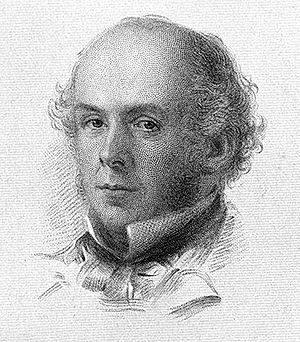Arthur Hugh Clough facts for kids
Quick facts for kids
Arthur H. Clough
|
|
|---|---|
 |
|
| Born | 1 January 1819 Liverpool |
| Died | 13 November 1861 (aged 42) Florence |
| Language | English |
| Nationality | British |
| Alma mater | Balliol College, Oxford |
| Genre | Poetry |
| Spouse | Blanche Mary Shore Smith |
Arthur Hugh Clough (/klʌf/ KLUF; 1 January 1819 – 13 November 1861) was an English poet and an educationalist. He was also a dedicated helper to Florence Nightingale, famous for her nursing work. Arthur was the brother of Anne Clough, who fought for women's right to vote. His daughter, Blanche Athena Clough, also became a principal at Newnham College, Cambridge.
Contents
Life Story of Arthur Clough
Arthur Clough was born in Liverpool, England, in 1819. His father was a cotton merchant. In 1822, when Arthur was young, his family moved to the United States. He spent his early childhood in Charleston, South Carolina.
Early School Days
When Arthur was nine, he and his older brother returned to England. They went to school in Chester. In 1829, Arthur started attending Rugby School. This school was led by Thomas Arnold, who believed in strict education. Arthur took these ideas to heart. He spent a lot of time at school and wrote for the Rugby Magazine.
Oxford University Years
In 1837, Arthur won a scholarship to Balliol College, Oxford. Oxford was a lively place then, with new religious ideas spreading. Arthur was interested in the High Church movement for a while. However, he later decided not to follow it.
He surprised many by getting a Second Class Honours degree. But he still earned a special position as a tutor at Oriel College. This job required him to teach the beliefs of the Church of England. Arthur felt he could not do this honestly. So, in 1848, he left his position.
Travels and New Ideas
After leaving Oxford, Arthur traveled to Paris. There, he saw the revolution of 1848 happening. He also met Ralph Waldo Emerson, a famous American writer. Emerson encouraged Arthur to keep exploring new ideas.
Arthur wrote a long poem called The Bothie of Tober-na-Vuolich in 1848. It was about leaving academic life behind. In 1849, he saw another revolution, the siege of the Roman Republic in Rome. This inspired his poem Amours de Voyage.
Life in London
In 1849, Arthur needed to support his mother and sister. He became the head of University Hall in London. This was a place for Unitarian students. But Arthur found the ideas there too strict, just like at Oxford. He also didn't like living in London much.
In 1852, he traveled to Cambridge, Massachusetts, in the United States. He gave lectures and edited books there. In 1853, he was offered a job in the Education Office in London. He returned to England and married Blanche Mary Shore Smith. He then had a steady career in government. He also spent a lot of time helping his wife's cousin, Florence Nightingale, with her important work. During these years, he wrote very little poetry.
Later Life and Death
Arthur's health began to fail in 1860. He traveled to Greece, Turkey, and France in 1861. This trip made him feel happy and inspired again. He quickly wrote parts of his last long poem, Mari Magno.
His wife joined him on a trip to Italy. Sadly, he became sick with malaria there. Arthur Clough died in Florence on 13 November 1861. He is buried in the English Cemetery in Florence. His friend, Matthew Arnold, wrote a famous poem called Thyrsis to remember him.
Arthur and Blanche had three children: Arthur, Florence, and Blanche Athena. His youngest daughter, Blanche Athena Clough (1861–1960), later became a principal at Newnham College, Cambridge. Her aunt, Arthur's sister Anne, was also a principal there.
Arthur Clough's Writings
Arthur Clough's poems often explored new ideas and questioned common beliefs. He was considered a forward-thinking poet of his time.
Early Works and Themes
Before leaving Oxford, Arthur wrote a pamphlet in 1847. It was about helping people during the Great Famine in Ireland. His poem The Bothie of Toper-na-fuosich (1848) was written in hexameter, a type of poetic rhythm. It talked about socialism and Scottish scenery.
Ambarvalia (1849) was a collection of shorter poems. Amours de Voyage was a novel told in verse, written in Rome in 1849. Dipsychus was a satirical poem written in Venice in 1850. His last poems, Mari Magno, or Tales on Board, were written in 1861.
Prose and Legacy
Arthur's main prose work was editing a 17th-century translation of Plutarch's Lives. This book was published in 1859.
Many of Arthur's works were published after he died. His wife, Blanche, helped to get his poetry published. Later editors have found it challenging to put all his works together. However, his poems are known for their deep thoughts and strong melodies.
Notable Short Poems
Clough wrote the inspiring poem "Say Not the Struggle Naught Availeth". This poem uses images of battle to encourage people to keep fighting for what is right. He wrote it after the defeat of the Chartism movement in 1848.
Other well-known short poems include "Through a Glass Darkly". This poem explores ideas of Christian faith and doubt. "The Latest Decalogue" is a funny, critical look at the Ten Commandments.
Arthur Clough's poems have even appeared in other famous works. For example, the novel The French Lieutenant's Woman by John Fowles uses lines from Clough's poems at the start of several chapters.
 | George Robert Carruthers |
 | Patricia Bath |
 | Jan Ernst Matzeliger |
 | Alexander Miles |

